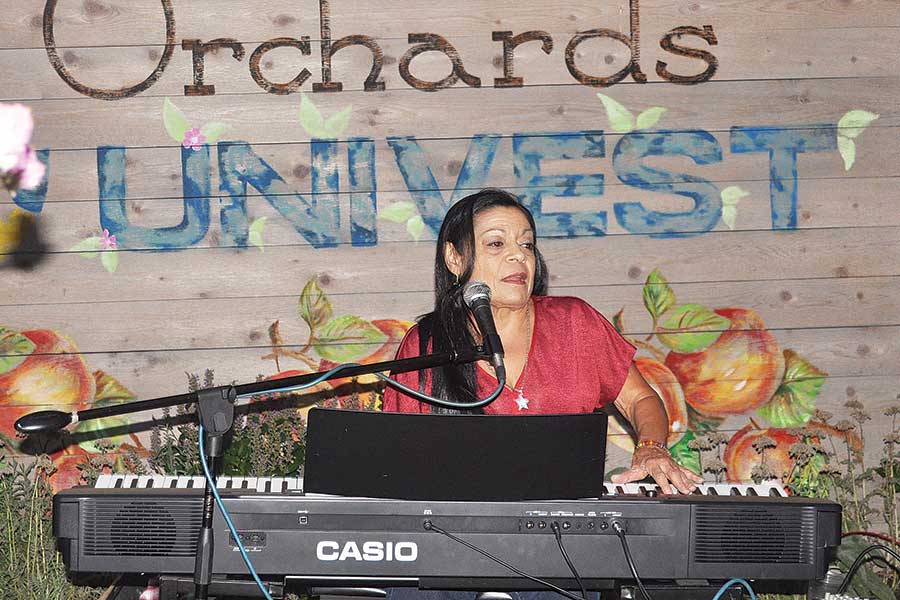On an early Sunday evening, with the sun still shining brightly outside her door, a small crowd gathers around mixologist Ashley Coleman’s bar at Tavern at Camac.
As people wander into the Tavern’s dark glow, the bar’s sleekly shined piano and stool — one of TOC’s most famous elements — sit empty.
For the Tavern’s true habitués, these Sunday evenings (along with Wednesday Night at the Drive-In) belonged to Patricia “Ghosha” D’Aguanno, the Gayborhood pianist/singer and longtime musical presence who passed away April 17 from the complications of cancer.
“Everything moved so quickly with her illness that it was shocking,” said Coleman. Barman Amede Bennett said he expected the “strong and emotional reaction” to come flooding in as the Sunday progressed.
He wasn’t wrong.
“The loss is just devastating. I feel it already,” said Louis Serafine, a 10-year veteran of D’Aguanno’s Sundays at TOC. Holding back tears, Serafine, dressed in black, brought long-stemmed roses that he set upon the piano near a makeshift memorial of a single candle and stones next to TOC’s glass, top-hat tip jar. Another decade-long fan of the late pianist, Andrew Mars from the band Settled Arrows, said, “Her soul always shone through in her music.”
Though she carried on with Thursday nights playing gigs at North Philly’s SawTown Tavern, the piano at Tavern on Camac was the center of her universe — and that of the Gayborhood — as far as most patrons were concerned. Jeffrey Beiter, D’Aguanno’s fellow Sunday TOC pianist, had only just set up a YouCaring crowd-funding site for D’Aguanno’s medical care. “The community is really hurting,” wrote Beiter on his Facebook page.
Musicians who worked with or around D’Aguanno over the years were quick to react to her passing with amusing stories. Michael Richard Kelly-Cataldi, co-owner of Glenside’s Dino’s Backstage, said that the pair both sang at the cabaret The Club Above 247 on South 17th Street in the ’80s. “Even when we performed on different nights, we would each come in and support the other,” he said.
Vocalist John Charles recalled many of D’Aguanno’s past showcases within the last 20 years: nights at the Bike Stop, Cibo on Walnut St., “where the waiters and waitresses got up and sang with her,” New Hope’s Cub Room and Key West. “I even saw her at a bed-and-breakfast in Switzerland,” said Charles.
D’Aguanno’s brother Frank D’Aguanno, a local musician who famously played in bands such as Meaningless Tag in the 1990s, filled in his sister’s biography.
“While there was a 21-year difference between us, we led very similar, oddly mirrored lives,” said D’Aguanno of his 67-year-old sister. She was born and raised at 33rd and Allegheny until the family moved to Bucks County. She attended Bucks County Community College and Temple University before getting involved in local music through studio advertising jingle work in the early 1970s. D’Aguanno eventually met her musical partner (“maybe beyond that too,” said her brother), Leslie Cao Mowatt. Together the pair moved to the West Coast in a quest for higher learning, “a very important spiritual part of her life.” Once she returned to Philly from that sabbatical, D’Aguanno formed a keyboard-based rock band called The Square Roots.
“It was around this same time too that she began connecting to the Philly gay community with showcases at the Bike Stop and 247,” said her brother.
What people may not have known about Ghosha D’Aguanno is that she held countless diverse jobs, from rose delivery and candle-making to working with horses in veterinarian clinics. Ghosha and Frank also began taking care of the children of their other sister, Lisa D’Aguanno, when she passed away in 2004. Around the D’Aguanno home in Feasterville, Frank says there are at least 60 boxes of Ghosha’s original music recordings and sheet music around their house. “She just wanted to make music.”
Stephen Carlino, owner of Tavern on Camac since 2004, noted that D’Aguanno was different from any other entertainer he had witnessed. “She played pop from the past to the present and could do so for five hours, non-stop, without a break and without sheet music. Beyond that, however, she was family. We thought that her having to take off work was the beginning of the fight.” That she died so quickly is devastating to Carlino, her brother and everyone around her, Carlino said.
“She was a comet that had to flame out immediately, rather than dissipate slowly,” said her brother.
